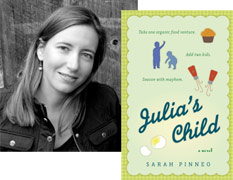I have often pondered the question of why QueryTracker is so effective at bringing writers together as a community. My favorite theory is that the querying process is a career bottleneck which forces everyone to learn a new and uncomfortable skill. When I recommend QueryTracker to people I meet, I often refer to it as a friendly "writers' ghetto." It's a place where whining about the query process is accepted, even encouraged. We encourage each other, we share information, we comfort those who hit road blocks. We gently steer first draft queries toward greatness, and we pass out tissues to those who bemoan the impossibility of compressing the nuance and greatness of their work into two solid paragraphs.
And while everyone deserves an occasional wallow, my opinion about the painfulness of query writing has evolved. A few years ago, as I strolled up a New York City avenue with my dear friend Abbey, she gave me a crumb of advice she’d once received during her formative years as an actress. And Abbey’s wisdom entirely changed my opinion about querying.
“Listen, kid,” she had been told. “If you want to be an actor, you’d better love auditioning. Because that’s what 90% of successful working actors do with most of their days—they audition. They wait in line. And then they get up in front of strangers and perform with a smile, and then they do it again the next day.”
The truth of it hit me like a wobbly stack of unsold manuscripts. Authors are in precisely the same boat. Pitching is a part of every writer’s life. And it doesn't go away once you land an agent.
Eventually I got my wish. By querying (and querying, and querying) I landed a terrific agent who sold my debut novel. Cue the champagne and streamers. But then last year we agonized together over the catalog copy. Later, the back cover copy. Then, I pitched other authors for blurbs to bedeck my shiny new cover. I pitched book bloggers who agreed to review it. And then? I wrote to every bookseller I've ever known, I pitched media outlets who might cover me.
I’m sure you've spotted the theme by now. The querying never stops. But—and it was a big surprise—I finally began to enjoy it.
Perhaps I shouldn't mention that I also enjoy preparing my own taxes. But my reasoning is the same. Who wouldn't want to devote a little extra time to really getting that right? In the same way that an accountant couldn't possibly care as much as I do about my bottom line, nobody knows my work as well as I do.
Which is just as well, because the pitching never ends. Having one success doesn't mean you’ll never write another pitch. If your agent believes your next book could be part of a two or three book deal, you’re going to have to write a few punchy paragraphs about the next books in the series.
Pitching, like taxes, is part of (the publishing) life. This is something your agent understands too. The first time your agent reads your pitch, she’s also writing her own in her head. Ditto your editor--she's going to have to sell your book to the acquisition meeting, and then later to her sales force. Agents and Editors are query writing professionals. If they can do it, so can you.
So we might as well stop hating pitching, and start to see it for the lifeblood that it is. A query, like an audition, is not an obligation, it's a chance to impress. So step up on that stage and give them your best Hamlet. To read or not to read. That is the question.

Sarah Pinneo is a novelist, food writer and book publicity specialist. Her most recent book is Julia’s Child. Follow her on twitter at @SarahPinneo.

2 comments:
You've made an important point that perhaps writers may not otherwise realize. Thank you.
Thank you, Debra!
Post a Comment